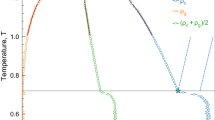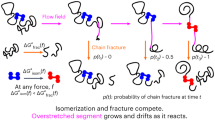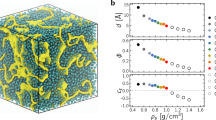Abstract
The tracer diffusion coefficient D* of small concentrations of tagged linear polymers seems well understood on the basis of the reptation model1–6, but the mutual diffusion coefficient D which characterizes diffusion at higher concentrations remains controversial7–17. Such diffusion is important in blends of miscible, yet chemically dissimilar, polymers where it controls the kinetics of phase separation and the welding of polymer interfaces. The controversy centres on predicting D from the D*s of the components of the blend. While the 'slow theory'7,8 predicts that D is controlled by the diffusion of the slower-moving component, 'fast theory'9,10 says it is controlled by the diffusion of the faster-moving one. Here we report experiments in which we measure the mutual diffusion coefficient as we increase the tracer diffusion coefficient of the faster-moving component in the blend by decreasing its molecular weight. The strong increase in D we observe demonstrates that the 'fast theory' prediction is correct.
This is a preview of subscription content, access via your institution
Access options
Subscribe to this journal
Receive 51 print issues and online access
$199.00 per year
only $3.90 per issue
Buy this article
- Purchase on Springer Link
- Instant access to full article PDF
Prices may be subject to local taxes which are calculated during checkout
Similar content being viewed by others
References
1. de Gennes, P. G. / chem. Phys. 55, 572–579 (1971). 2. Doi, M. & Edwards, S. F. JCS Faraday Trans. II 74, 1789–1801 (1978). 3. Klein, J. Nature 271, 143–145 (1978). 4. Antonietti, M., Coutandin, J., Gruetter, R. & Sillescu, H. Macromolecules 17,798–802 (1984). 5. Green, P. F., Mills, P. J., Palmstr0m, C. J., Mayer, J. W. & Kramer, E. J. Phys. Rev. Lett. 53,2145–2147 (1984). 6. Tirrell, M. Rubber Chem. Tech. 57, 523–556 (1984). 7. Brochard, F., Jouffroy, J. & Levinson, P. Macromolecules 16, 1638–1641 (1983). 8. Binder, K. J. chem. Phys. 79, 6387–6409 (1983). 9. Kramer, E. J., Green, P. & Palmstr0m, C. J. Polymer 25, 473–480 (1984). 10. Sillescu, H. Makromol. Chem. rapid Commun. 5, 519–523 (1984). 11. Gilmore, P. T., Falabella, R. & Lawrence, R. L. Macromolecules 13, 880–883 (1980). 12. Green, P. F., Palmstr0m, C. J., Mayer, J. W. & Kramer, E. J. Macromolecules 18, 501–507 (1985). 13. Jones, R. A. L., Klein, J. & Donald, A. M. Nature 321, 161–162 (1986). 14. Composto, R. J., Mayer, J. W., Kramer, E. J. & White, D. M. Phys. Rev. Lett. 57, 1312–1315 (1986). 15. Murshall, U., Fischer, E. W., Herkt–Maetzky, Ch. & Fytas, G. J. Polymer Sci. Lett. 24, 191–197 (1986). 16. Brochard, F. & de Gennes, P. G. Europhys. Lett. 1, 221–224 (1986). 17. Garabella, R. W. & Wendorff, J. H. Macromolecules (in the press). 18. Flory, P. J. Principles of Polymer Chemistry 507–511 (Cornell University Press, Ithaca, 1953). 19. Mills, P. J., Green, P. F., Palmstr0m, C. J., Mayer, J. W. & Kramer, E. J. Appl Phys. Lett. 45,957–959(1984) 20. White, D. M. & Nye, S. A. Macromolecules 17, 2643–2644 (1984) 21. Mills, P. J., Green, P. F., Palmstr0m, C. J., Mayer, J. W. & Kramer, E. J. /. Polymer Sci. 24, 1–9 (1986) 22. Jordan, E. A. et al. Macromolecules (in the press).
Author information
Authors and Affiliations
Rights and permissions
About this article
Cite this article
Composto, R., Kramer, E. & White, D. Fast macromolecules control mutual diffusion in polymer blends. Nature 328, 234–236 (1987). https://doi.org/10.1038/328234a0
Received:
Accepted:
Issue Date:
DOI: https://doi.org/10.1038/328234a0
This article is cited by
-
The effect of phase separation on crystallization of polyethylene/poly(ethylene-alt-propylene) blend
Journal of Polymer Research (2021)
-
Unique evolution of spatial and dynamic heterogeneities on the glass transition behavior of PVPh/PEO blends
Chinese Journal of Polymer Science (2012)
-
Mutual diffusion studies of polystyrene and poly(xylenyl ether) using Rutherford backscattering spectrometry
Journal of Materials Science (1991)
-
Study of the polymer surfaces with improved resolution FRES
Hyperfine Interactions (1990)
Comments
By submitting a comment you agree to abide by our Terms and Community Guidelines. If you find something abusive or that does not comply with our terms or guidelines please flag it as inappropriate.



